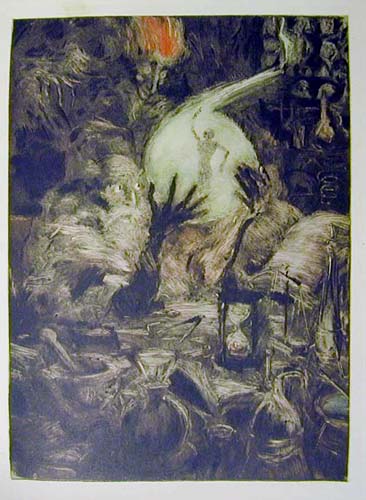November 2009
Dear Soul-Seeker, by Bob Cergol
A letter and talk notes that Bob prepared for the recent weekend spiritual intensive, Enlightenment & Grace: Removing Resistance to Destiny, at Durant Nature Park in Raleigh, NC on the weekend of October 10th.
[continued from the main Forum page]
 I think it was during Richard Rose's Lecture of Questions at my first
or second meeting with him when I heard him ask: "Do you have a soul? Or are
you a soul?" Christianity teaches that the soul is the part of you that survives
death—and that it is yours to "polish" or "stain"—establishing its final
disposition in eternity.
I think it was during Richard Rose's Lecture of Questions at my first
or second meeting with him when I heard him ask: "Do you have a soul? Or are
you a soul?" Christianity teaches that the soul is the part of you that survives
death—and that it is yours to "polish" or "stain"—establishing its final
disposition in eternity.
But you're way too smart and sophisticated to accept such dogma—yet—your mere presence at this gathering suggests you believe something not all that dissimilar. Many people like to think that "God is within." Of course you do—as that places you anterior to God Himself. Just maybe God is what is left when nothing of you remains ….
Regardless, whether you own it, or are it, why would you then need to search for it?! Where do you search? What do you look for?
The ego-centric point of reference holds as the object of attention only
that which affirms itself and looks away from all that does not.
It matters what you look at—and what you do not look at. What are you
looking at right now?
---------------------------------------------------
Obsession With the Body, from I Am That, by Nisargadatta.
"I see what you too could see, here and now, but for the wrong focus of your
attention.
You give no attention to your self. Your mind is all with things, people and
ideas, never with your self. Bring your self into focus, become aware of your
own existence.
See how you function, watch the motives and the results of your actions. Study
the prison you have built around yourself by inadvertence.
By knowing what you are not, you come to know your self. The way back to your
self is through refusal and rejection.
One thing is certain: the real is not imaginary, it is not a product of the
mind. Even the sense 'I am' is not continuous, though it is a useful pointer; it
shows where to seek, but not what to seek. Just have a good look at it. Once you
are convinced that you cannot say truthfully about your self anything except 'I
am', and that nothing that can be pointed at, can be your self, the need for the
'I am' is over—you are no longer intent on verbalizing what you are.
All you need is to get rid of the tendency to define your self. All definitions
apply to your body only and to its expressions. Once this obsession with the
body goes, you will revert to your natural state, spontaneously and effortlessly.
The only difference between us is that I am aware of my natural state, while you
are bemused. Just like gold made into ornaments has no advantage over gold dust,
except when the mind makes it so, so are we one in being—we differ only in
appearance. We discover it by being earnest, by searching, enquiring,
questioning daily and hourly, by giving one's life to this discovery."
---------------------------------------------------
I've heard that Nisargadatta did not write anything. What we have are transcriptions of his conversations with visiting soul-seekers. I think he worked very hard to break down the barriers to realization in his visitors, coming at it from two angles:
Firstly he wanted to open your heart and clear your vision to see past selfishness by evoking a sense of the reality of something self-less and time-less,—that resonates with you, for the simple reason that truly, you are that.
Secondly he wanted to goad you into taking action—an action no less simple—but apparently very difficult for most—than looking at one's self. In the book I Am That you can open the book at any random page and you won't have to read very far before you encounter the word "earnest"—usually in connection with examination of one's self and one's experience.
The word earnest occurs 150 times in I Am That. The word "effortless" just 27—and always in the context of being the fruit of earnestness in one's looking. Yet his exhortations to be earnest seem to be the least memorable and least quoted.
Relaxing into forgetfulness of self does not lead to self-transcendence.
Here is another quote to consider. I cannot find the precise source but remember reading it in, or hearing it read from, the Bible, and attributed to Christ.
"To a young man sitting and waiting on the side of the road, he said: 'God won't send a wheelbarrow for you.'" For almost 20 years I expected Richard Rose to send the wheelbarrow for me. This was the result of blind self-dishonesty born of narcissism.
You must look in order to see. Do you see clearly? Why not? You do not arrive at clear seeing of yourself without looking deeply into your experience and your reactions to it—and you are not looking at yourself when you are dreaming—or singing lullabies—and you are not going to drift into awakening—just the opposite, the momentum of experience leads to intoxication and sleep. The plain fact is that unless something dramatic occurs to shock you into a keen and painful sense of self-doubt– you simply are not going to look at what you need to look at—your own internal state. You'll dream your life away—entrenched in the dream of identity dreaming.
 You will never see any of this until you become painfully in doubt as to the
status of your existence. For some of you this will only happen during your
physical death—provided you have developed the momentum of
examining the nature of your experience, i.e. being a witness to experience instead of participating in it.
If you don't develop this momentum then your death will be just another intense
experience that intensely binds awareness to the personal identity that will
disappear into oblivion. You have a chance of seeing—while the drop—the
ocean from which that drop is indistinguishable—otherwise the drop disappears
into the ocean with no awareness of what it is forever, and was, in the Pralaya.
The ocean remains of course for it doesn't depend on the drop's perception.
Small comfort for you....
You will never see any of this until you become painfully in doubt as to the
status of your existence. For some of you this will only happen during your
physical death—provided you have developed the momentum of
examining the nature of your experience, i.e. being a witness to experience instead of participating in it.
If you don't develop this momentum then your death will be just another intense
experience that intensely binds awareness to the personal identity that will
disappear into oblivion. You have a chance of seeing—while the drop—the
ocean from which that drop is indistinguishable—otherwise the drop disappears
into the ocean with no awareness of what it is forever, and was, in the Pralaya.
The ocean remains of course for it doesn't depend on the drop's perception.
Small comfort for you....
Can you follow the "I-am" as Nisargadatta advised? Probably not—at least not as you suppose—by visualizing that you are looking at it—secure and comfortable in your bunker. When you think you meditate—and stop looking at "noise"—you are simply staring at the single thought "not looking at anything"—or looking at a mental picture of yourself—or go to sleep, forgetting yourself in a resumption of dreaming.
What are you looking at this very moment? You are looking at the external world—seeing the people in this room, hearing my words, watching me speak them. You are always looking at external experience—and you are looking at it from the personal viewpoint.
But another looking is also occurring. You are looking at your own presence in this room, sitting in the chair, looking at yourself looking out at external experience—and reacting with feelings and thoughts. This looking from the reaction point is your sense of self—identity—the ego-centric position— and the backstop. It is still an external experience. There is yet another looking that is also going on—this very moment—seemingly outside your field-of-vision. This looking never ceases—not even when you are in your deepest sleep. This looking is always looking at the capacity to look—the power to look—straining to see content and form—but presented with explosive experience—still sees nothing—except the infinite capacity to look infinitely. It is anterior to you, but not separate.
Christ said: "The Light of the Body is the Eye." The eye is that which sees. What you refer to when you say "I" or hear "you" has no power to see anything. What is it about you that has the power to look and see?! It is not dependent on you. Your presence in the view merely casts a shadow color to all else in the view.
By looking at your reactions—thoughts and feelings—but not getting lost in reactive thoughts while looking—you become the witness to experience instead of a sleepy participant in experience. Can you look and see yourself with honesty? If so, then you might be able to look directly at the very experience of self—which is your most immediate experience.
Let's talk about honesty and intuition in self-inquiry and thought versus feeling. All thought and feeling is reactive. Intuition is seeing clearly—what is—without interpretation, or motive. As soon as thought enters into the process of seeing—the weaving begins—identity spinning identity …. Feeling generally precedes thinking—though they can spin around in a chain-reaction. There is a single direction to all of the reactions:—self-preservation. You won't accept or see anything else. This is why it is so fundamentally important to unwind your rationalization and understand the sway of your emotions. Do you want to validate yourself? Or know your Self? Both desires are innate in you—but one will win out—for many of you—the former.
 Your blind spot, your point of fixation, the ego-centric position is automatic
and unyielding. This is the point of reference from which whatever is the object
of your attention is viewed.
Your blind spot, your point of fixation, the ego-centric position is automatic
and unyielding. This is the point of reference from which whatever is the object
of your attention is viewed.
You cannot see the real self from the ego-centric point of view. All attempts to do so are deflected just before the jeopardy such looking engenders is grasped consciously. You can only look at what is not the self. Here is perhaps an analogy relevant in your experience.
When a flash goes off in a darkened room, or you blink at a bright light source in a shaded room with closed eyes, a few seconds later, a strikingly clear image of the scene illuminated by the light source appears and gradually fades. The image includes in sharp focus the full sweep of everything that was in the field of vision at the moment the flash occurred. It's so clearly visible that it seems as though you can move your eyes and look directly at any single object. But as soon as you do, the entire image likewise moves—so that the fixed point of view remains constant.
This is a good description of the process by which we see, and don't see, reality and ourselves. The "ego-centric position" presents a version of experience that denies, fights, and deflects anything that is unacceptable. Knowing that self-delusion is possible presents an obvious imperative.
What should you do? Commit! Look! Act!
Sincerely, in friendship, always behind you,
Bob
P.S. Here's another good quote from Nisargadatta to contemplate:
'I am': The Foundation of all Experience, from I Am That, by Nisargadatta.
"Of the unknowable only silence talks. The mind can talk only of what it knows. If you diligently investigate the knowable, it dissolves and only the unknowable remains. But with the first flicker of imagination and interest the unknowable is obscured and the known comes to the fore-front. The known, the changeable, is what you live with—the unchangeable is of no use to you. It is only when you are satiated with the changeable and long for the unchangeable, that you are ready for the turning round and stepping into what can be described, when seen from the level of the mind, as emptiness and darkness. For the mind craves for content and variety, while reality is, to the mind, content-less and invariable."
Q: It looks like death to me.
M: It is. It is also all-pervading, all-conquering, intense beyond words.
Summary Notes:
Experience is binding. Experience has an effect upon the attention. Wrong effort generates more experience and more reaction—or daydreaming and sleep.
Right effort generates detachment and clarity.
Intense experience is intensely binding.
Your most immediate experience is the sense of self.
Witnessing experience is liberating.
Effort and action has an effect upon the attention.
The only value in effort and action is this effect.
---------------------------------------------------
Going Within
Where?
Who?
What is the object of the attention? Reaction/Experience
"Going Within" is the breaking of the identification with experience—accompanied by an experience of "loss of self".
~ The event at which Bob spoke was hosted by The Self-Inquiry Discussion Group of Raleigh, NC.
Return to the November TAT Forum

